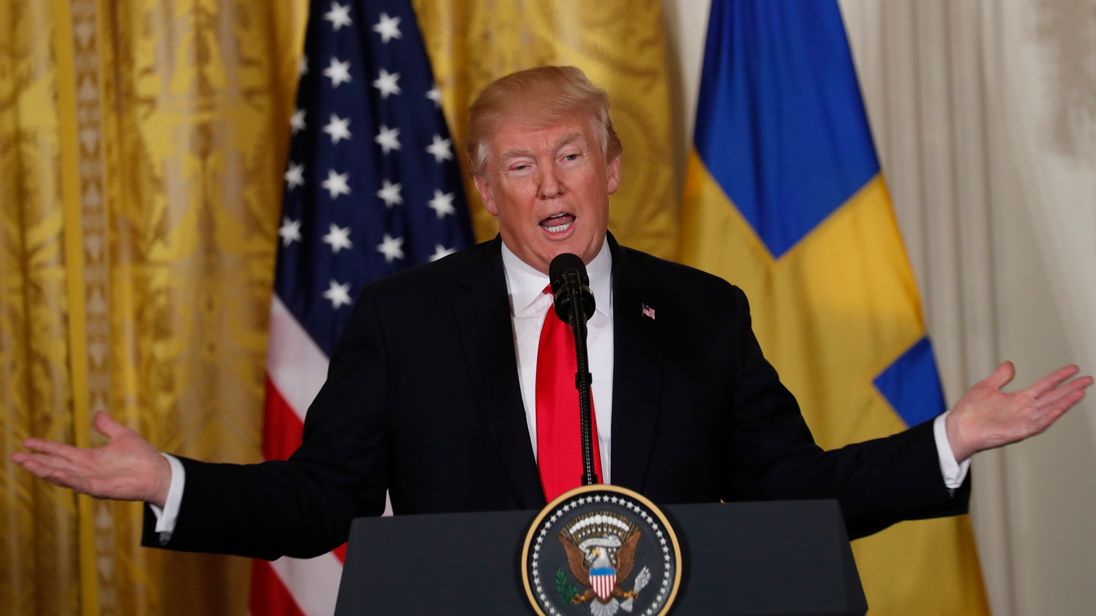The head of the US central bank says members of its rate-setting committee have reported "concerns" among business leaders over the impact of President Trump's protectionist agenda.
Jerome Powell made the remarks at his first policy news conference since Mr Trump appointed him to replace Janet Yellen.
The US Federal Reserve had, just moments earlier, raised interest rates for the first time this year to a new range of 1.5-1.75%.
It cited a stronger outlook for economic growth and did not give reasons for the higher projection – saying that it was based on the median expectations of the committee.
Economists currently expect massive tax cuts, announced by the President just before Christmas, to bolster growth in the short term though Mr Powell said the effects would be very uncertain.
A weaker dollar and strong job creation is also forecast to drive growth.
:: Danger for US firms from Trump trade tariffs
The Fed continued to forecast two further interest rate rises this year and hinted that there could be three, rather than two, to follow in 2019, so long as inflation remained stable in and around its target range of 2%.
Mr Powell told reporters there were no signs that prices were set to run away.
The dollar weakened – falling more than half a cent against sterling to hit $1.4130 in the wake of his remarks, as they were seen as more dovish than the markets were expecting.
Many observers had expected a faster pace of rate rises this year.
Mr Powell said there was no thought on the Federal Open Market Committee that changes in trade policy would affect the current outlook in terms of downside risk.
But he admitted a number of members had reported back on concerns expressed to them within corporate America about risks arising from US trade tariffs.
The Trump administration stoked fears of a tit-for-tat trade war earlier this month when it confirmed tariffs on steel and aluminium products from abroad.
More from Business

It confirmed earlier on Wednesday that it will decide by the end of April which nations will be exempt amid continuing negotiations with the EU, which has threatened retaliatory action.
US officials are tipped to confirm on Thursday additional investment restrictions on China to help close, what it says, is a $375bn trade deficit with the world's second largest economy.
The head of the US central bank says members of its rate-setting committee have reported "concerns" among business leaders over the impact of President Trump's protectionist agenda.
Jerome Powell made the remarks at his first policy news conference since Mr Trump appointed him to replace Janet Yellen.
The US Federal Reserve had, just moments earlier, raised interest rates for the first time this year to a new range of 1.5-1.75%.
It cited a stronger outlook for economic growth and did not give reasons for the higher projection – saying that it was based on the median expectations of the committee.
Economists currently expect massive tax cuts, announced by the President just before Christmas, to bolster growth in the short term though Mr Powell said the effects would be very uncertain.
A weaker dollar and strong job creation is also forecast to drive growth.
:: Danger for US firms from Trump trade tariffs
The Fed continued to forecast two further interest rate rises this year and hinted that there could be three, rather than two, to follow in 2019, so long as inflation remained stable in and around its target range of 2%.
Mr Powell told reporters there were no signs that prices were set to run away.
The dollar weakened – falling more than half a cent against sterling to hit $1.4130 in the wake of his remarks, as they were seen as more dovish than the markets were expecting.
Many observers had expected a faster pace of rate rises this year.
Mr Powell said there was no thought on the Federal Open Market Committee that changes in trade policy would affect the current outlook in terms of downside risk.
But he admitted a number of members had reported back on concerns expressed to them within corporate America about risks arising from US trade tariffs.
The Trump administration stoked fears of a tit-for-tat trade war earlier this month when it confirmed tariffs on steel and aluminium products from abroad.
More from Business

It confirmed earlier on Wednesday that it will decide by the end of April which nations will be exempt amid continuing negotiations with the EU, which has threatened retaliatory action.
US officials are tipped to confirm on Thursday additional investment restrictions on China to help close, what it says, is a $375bn trade deficit with the world's second largest economy.











